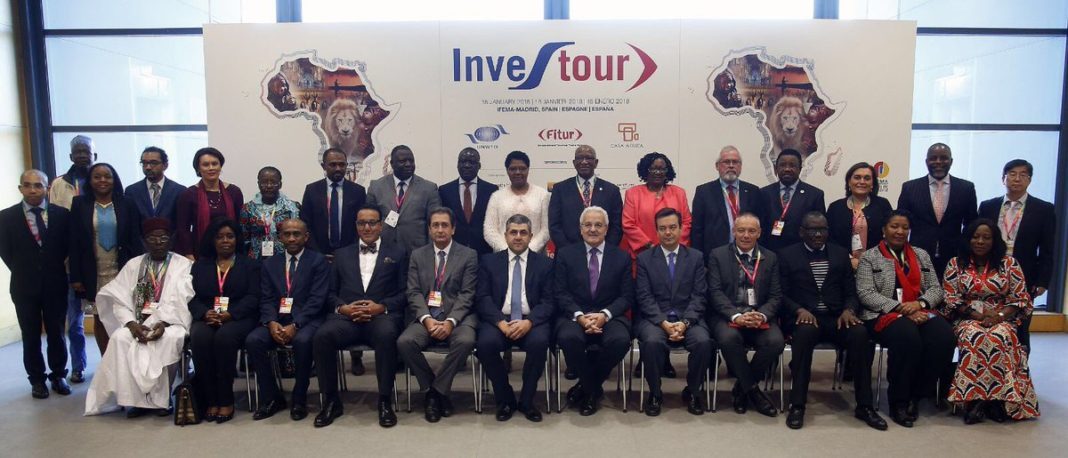

Brand Africa and biodiversity focus of INVESTOUR in Madrid
Nearly 30 African Tourism ministers convened at INVESTOUR to debate and exchange experiences on the development of the sector in the continent. This unique Tourism Investment and Business Forum for Africa is jointly organized by the World Tourism Organization (UNWTO), Casa Africa and FITUR.
Two round tables and a business-to-business component integrates the 9th edition of INVESTOUR that took place in the framework of FITUR, the Tourism Fair in Madrid. The first session, moderated by Thebe Ikalafeng, Chairman at Brand Africa, addressed branding strategies to position the African continent in the travel market.
“International tourist arrivals in Africa grew by around 8% for the second consecutive year with 62 million arrivals registered for 2017. These strong results that show the potential of tourism in Africa but also the prioritization of the sector in the development agenda in the continent,” said UNWTO Secretary General Zurab Pololikashvili.
“INVESTOUR has become a consolidated platform for sharing ideas and projects around the tourism sector in Africa. We started as a small summit and nine years later, nearly 30 African tourism ministers convene here to position the African continent, a topic that will occupy the debates in this year’s edition,” explained Luis Padrón, Director General of Casa Africa.
The second panel evaluated the added value of African biodiversity as a strong component of the tourism sector in the continent. Wildlife, reserves and geographic treasures make Africa unique with regard to its tourism offer. According to UNWTO research, wildlife watching travel represents 80% of the total annual tourist arrivals to Africa. However, it is mandatory to continue working on conservation and protection measures and to engage stakeholders of different nature such as governments, local communities, private sector recipients and the media.
Within that round table, the UNWTO/Chimelong Programme on Wildlife Conservation and Tourism was presented. The initiative, jointly implemented by UNWTO and the Chimelong Group, based in Guandong (China), aims at contributing to the Sustainable Development Goals and the 2030 Agenda through sustainable tourism and particularly wildlife conservation. The initiative comprises capacity building, advocacy and knowledge sharing methodologies and addresses multiple stakeholders such as governments, civil society and the media.
In the afternoon, tourism stakeholders gathered to discuss business opportunities in the continent. 15 inspiring projects were shared with the aim to build partnerships around tourism development in African nations.
Speaking to the press at that Investour 2018, Elsia Grandcourt, Head of the Africa Commission at the UNWTO said:- “One of the greatest challenges we face, together, is how the world views Africa. We are all aware of the negative stereotypes and perceptions that our continent sadly is much too often referred to”.
Elsia Grandcourt went on to say that there are many forces of influence that work against Africa and together we often blame the media for reinforcing a negative narrative. “The fact remains, however, that we must work towards redefining and shifting the narrative. We must tell our story, as individual African nations, and as one Africa. This is one of the priorities for the Commission for Africa”. Elsia Grandcourt, the Head of the Africa Commission at the UNWTO said.

Impact Travel: Measured – Green – 2050 proof
“Coming out of the World Tourism Organization’s (UNWTO) Sustainability Committee this week, I was struck by how far we’ve advanced in the past 25 years, in putting the idea of green travel into the mainstream of our sector. And at the same time, how far we still have to go.”
These are the words by Professor Geoffrey Lipman , Director of SUNx – Strong Universal Network – a program of the EU based, not for profit Green Growth and Travelism Institute, and a legacy to the late Maurice Strong – Sustainable Development Pioneer. SUNx goal is to promote Climate Resilient, Impact-Travel through a global cloud-connected network of Learning, Innovation and Resilience Centres. He is also President ICTP, International Coalition of Tourism Partners.
Professor Lipman continues: “It’s been a privilege to be a part of that journey, in the private, public and NGO camps, and most recently as co-founder of SUNx (Strong Universal Network) – a Climate Resilience initiative for my friend, and global sustainability champion, the late Maurice Strong. SUNx is an advocate for “Impact-Travel” measured to manage: green to grow: 2050-proof to transform.
In the past quarter-century, since the 1992 Rio Earth Summit, our sector evolved from a simple niche concept of eco-tourism to the 2017 UN Year of Sustainable Tourism, with over a thousand events, across the globe, covering virtually every type of travel and tourism product, as well as engaging visitors and visited.
On the way, there has also emerged a myriad of certification schemes, green conferences galore, mushrooming observatories for analytics and a plethora of awards to motivate companies, destinations, and travelers. CSR has jumped from periphery to mainstream.
We have hundreds of names and definitions to describe a wide range of green-hued products – eco, responsible, geo, adventure, pro-poor, fair trade, and conscious for example. Many operate at the destination level, some regional, others global.
And we have a massively expanding series of initiatives to measure tourism’s impacts – dashboards, indices, reports, roadmaps, satellite accounts and simulations, inside the sector. Outside, we have the 2030 focused measurement frameworks of 17 SDG’s, 169 targets and 304 indicators, with their national initiatives and local application. And the overriding 2050 demands of the Paris Climate Agreement, with its below 2 degrees eXistential targets.
Yet it seems to me we are making excellent tactical initiatives – big tactical initiatives, but what we don’t have, is a coherent “systems approach to sustainability”. that helps move these disparate approaches down a positive change pathway.
A pathway that is not only relevant to our sector but links to all of the other closely intertwined socio-economic sectors. That is “glocal”, with global principles applied locally. That works in smart cities, rural communities, national parks and small islands. And that encompasses the big indicators of the SDG, dealing with planetary life, and the Paris Climate Targets dealing with our very survival as a species.
And this is where the concept of Impact-Travel has a role to play. The term was coined by Professor Klaus Schwab, Founder of the World Economic Forum, to describe, on one hand, the immense socio-economic benefits of human mobility, and on the other the serious, unintended environmental consequences. It was also cast in the context of the Forum’s vision of a disruptive 4th Industrial Revolution, where the travel and tourism sector – transport, hospitality, services and infrastructure – will have big, new challenges & opportunities.
This idea was then framed by SUNx as a template, with 3 basic characteristics, that easily distinguish any sustainable tourism approach:-
Measure to Manage – good and bad impacts analysed and proactively dealt with together. There can be no universal measuring system – regions, countries and communities have differing needs and approaches, as do sectors and sub sectors, companies, travellers and residents. Some will be big data and sensor based; some will be global and top down: some will be micro and bottom up. The key criteria will be that measurement must be transparent, continuous and ultimately recorded.
Green to Grow – low carbon, renewable energy, social inclusion, technologically savvy and nature based. We are not talking just about sector standards, there are global socio-economic and geo-political factors to reflect. There are also planetary boundaries.
2050-proof to Transform – with the Sustainable Development Goals as a medium term objective, the 4th Industrial revolution as a new frontier of challenges and opportunities and the Paris Climate targets as a hard backstop.
All of these should be reflected in any truly sustainable travel product and service.
Going forward, like other sectors, we will particularly have to address our impacts in terms of carbon (transport – particularly, fossil fuel dependent, aviation, and buildings), social inclusion, resource utilisation (water, food, and waste), biodiversity depletion and “people congestion” – so called Overtourism.
There are too many dynamics in a rapidly evolving global marketplace, to rationally contemplate a magic bullet, “one size fits all”, sustainability solution. There are many excellent schemes in play and there will be many more based on technology and innovation. What we will still need however is a road to travel together, where all the many contributing approaches can advance on their own terms, and at their own development pace.
At SUNx, we believe Impact-Travel can be a helpful roadmap for that journey, and will collaborate inside and outside the sector, to keep the focus on the general sustainability concept, and on the overriding climate resilience imperative.”
